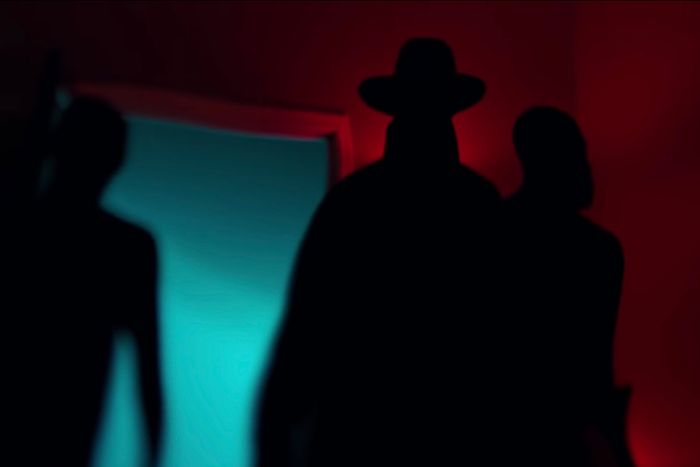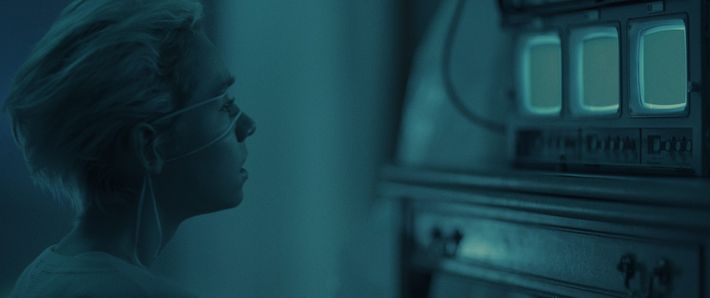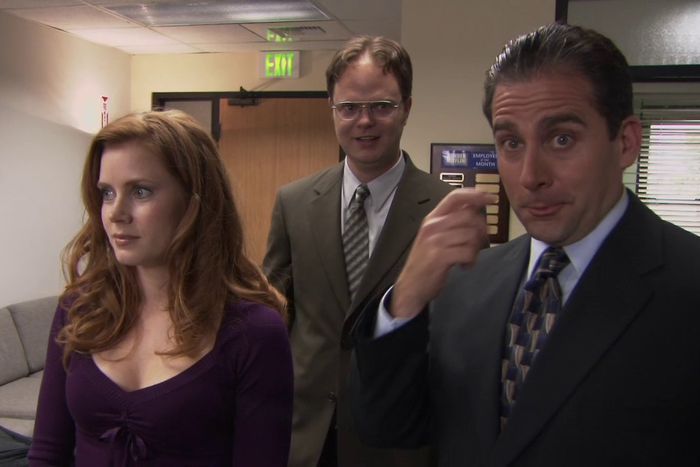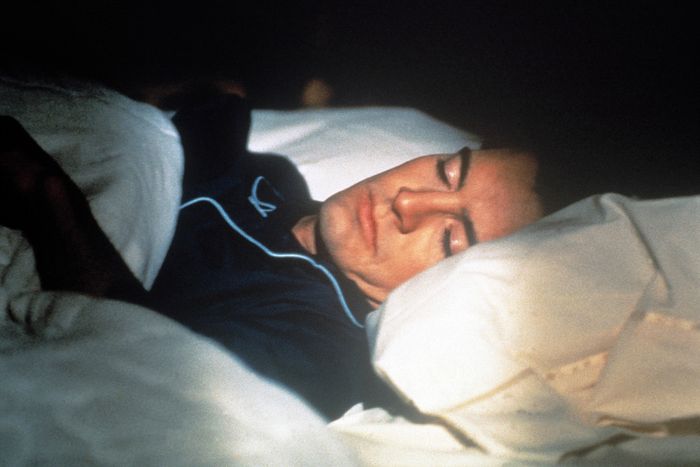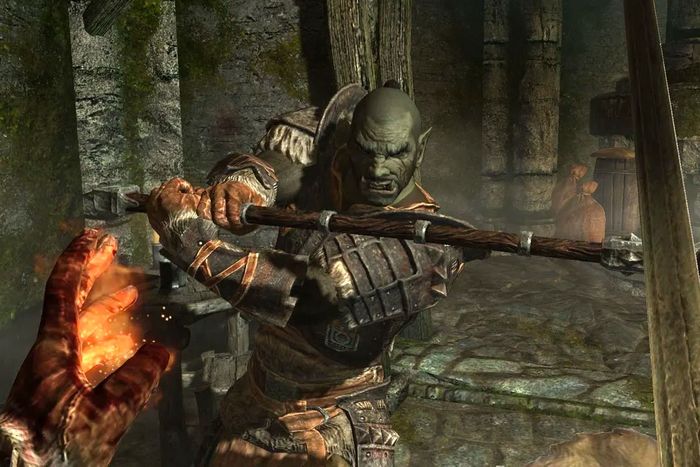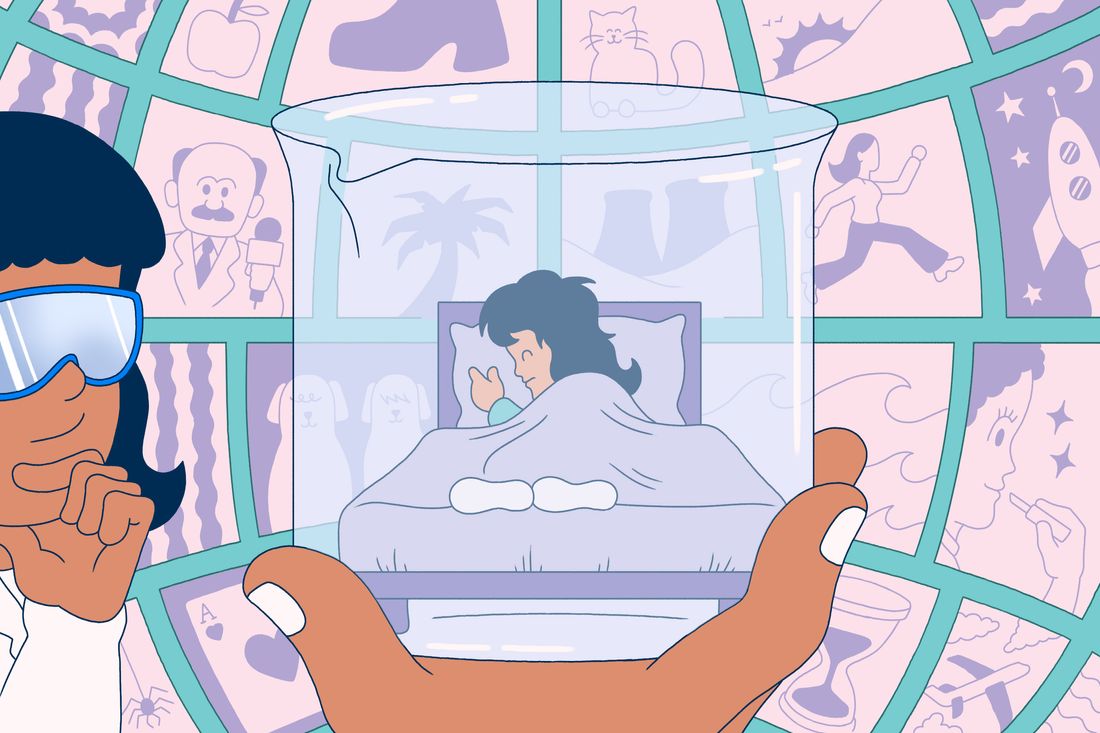
Here is an incomplete list of things I need in order to fall asleep at night: a room that sustains 70 degrees without the help of air-conditioning; complete darkness and total voidlike silence save for a shockingly loud white-noise machine placed directly next to my head; five pillows (one under my head, one under my chin, one between my knees, one directly on top of my face, one sitting on top of my chest); a completed to-do list; a clean apartment; a clean conscience; the knowledge that everyone I love is never going to die; assurance from a Russian official with total security clearance that they aren’t going to incite nuclear war; universal health care; and a fan.
In the absence of all of these conditions, I am wide awake roughly half of most nights, which explains both my entire personality and why a recent study in the Journal of Sleep Research stopped me in my extremely slow tracks. The study examines another nightly prerequisite of mine: watching something on my laptop for at least 30 minutes before bed. I’ve found that the best way for me to turn off my overactive brain before sleep is to fill it to the brim with fiction (preferably distressing horror films or TV shows with haunting overtones), after which I certainly don’t sleep well but do eventually reach some recognized form of unconsciousness. I’ve always been vaguely worried that this practice is somehow morally and physiologically “bad” but not worried enough to actually do anything about it except stay awake and panic.
For years, science and conventional wisdom have stated unequivocally that looking at a device — like a smartphone, tablet, laptop, or television — before bed is akin to lighting years of your natural life on fire, then letting the flames consume your children, your community, and the very concept of human progress. Simply Google “screens before bed” and you’ll find thousands of articles, many from higher-education institutions and furious British people (they seem the most worked up about this issue as a nation). The message is clear: The blue light emitting from your devices is destroying your natural melatonin reserves, altering your circadian rhythms, and making you ugly. Watching TV or TikTok before bed is giving you headaches and making you confused, leading to depression, diabetes, cancer, and early death. If your offspring opt for the same crutch, they will never achieve greatness.
However, according to national polls and anecdotal evidence from nearly every single person I know, this information has not significantly altered behavior. In 2011, nine out of ten people admitted to using a device before bed, a TV being the most popular (60 percent), and this was before the quantum timeline split and we all had to grapple with living inside a grad student’s thought experiment on populist fascism. In 2020, 66 percent of people admitted to sleeping with their phones. And while it’s true that more than one-third of adults report “not getting enough sleep,” that means two-thirds are getting enough sleep. In other words, most of the population is likely mainlining blue light before bed while sleeping fine. Ask British people to explain that!
A new study in the Journal of Sleep Research, published in February 2022 and funded by Michigan State University (not to be confused with University of Michigan, where I went to college and researched what happens when you commingle sleeplessness with seasonal depression and Natty Light), runs refreshingly counter to common sleep-and-screens wisdom. Specifically interested in the use of “entertainment media” (streaming services, video games, podcasts) before bed, researchers asked a group of 58 adults to keep a sleep diary and found that, if participants consumed entertainment media in the hour before bed, the habit was associated with an earlier bedtime as well as more sleep overall (though the benefits diminished if participants binged for longer than an hour or multitasked on their phones). Essentially, these researchers explored screen use before bed as a form of relaxation rather than a form of self-harm, which is exactly how I and probably 5 billion other people use it — as a way of distracting our minds from the onslaught of material reality just before we drift off to temporary oblivion.
Reading the study, I wondered if a rift was afoot, obviously in the space-time continuum but also in the world of sleep research, pitting anti-blue-light standpatters against a new class of pro-media heretics. Some Brits, for one, seemed convinced by the new research. But was it otherwise falling on ears gone deaf from years of watching loud stuff on our phones at night? For a brief moment, I thought it hubristic to insert myself — a nonscientist and tired person — into a decades-long academic discourse over whether screens are actually bad for us before bed. But then I realized, Who cares? What is a “screen”? What is “bed”? What is “bad”? Who is “us”? Empowered by the many women in STEM before me, I decided I would bravely peer review the study by studying … myself.
I would spend two weeks keeping my own sleep diary, measuring the effects of my nightly TV-watching habits on the quality and quantity of sleep I achieved. Along the way, I would speak to sleep doctors and experts in the field of sleep research to unpack what it means to “sleep” “well” in the Anthropocene. I would interview my friends and family members about their own bedtime habits, which range from watching The Office on an infinite loop to the most depraved habit of all: doing nothing. I would try to get in touch with the guy who founded Headspace, a former Buddhist monk with a degree in circus arts who decries screens before bed but developed an app that instructs you how to fall asleep from a screen. Could I, in the course of my own objectively stupid and scientifically deficient research, challenge the entrenched Christian concepts of good and bad, releasing us from the self-perpetuating prison of attaching a moral dichotomy to biological imperatives? Or would I just end up reiterating that looking at our phones before bed is dark-sided and we will all definitely die from it?
Day 1: Finding Control
Like all great scientists, I open my Notes app, wherein I will keep track of whom I’ve spoken to each day of my experiment, what I’ve learned, what I did in the hour before bed each night, how many times I woke up from sleep thereafter, how long and well I slept overall, and variations on the themes of my recurring nightmares. Each night, I’ll put into practice some piece of advice I’ve been given or stumbled upon in an attempt to figure out whether I sleep better when I am on or off screens. In order to re-create at least a little bit of the Journal of Sleep Research study’s prestige (its participants were trained to use an electroencephalogram to track electrical activity in their brain), I’ll also obtain access to an EEG or some other similarly scientific machine (e.g., the one in The Prestige that clones and then kills you) to measure the quality of my sleep.
Some important things to note before we begin: I have interstitial cystitis, which is a complex way of saying I am in constant pain and wake up to pee a million times a night. I’m also a few weeks out from having COVID-19 and am still 900 percent more exhausted than I normally am, so tonight I’m too tired to watch anything before bed. This is atypical but perhaps helpful for the experiment. A “control,” if you will, in a “study” devoid of them and everything else you need in order to do a study (vials?). I drift off pretty quickly and proceed to have one of my most upsetting recurring nightmares, wherein an angry mob emerges from the woods to murder me for crimes unknown. After that nightmare, I can’t go back to sleep because I am so freaked out that I am going to be Beauty and the Beast–ed. I sleep less than five hours.
Day 2: A Surprising Definition
Drunk with fatigue, I kick off my first of many interviews with Dr. Janet Kennedy, a.k.a. NYC Sleep Doctor, a clinical psychologist who specializes in helping New Yorkers calm the fuck down enough to sleep. Off the bat, I think I offend her by calling her “Janet” instead of “Dr. Kennedy.” From now on, I decide to call everyone “Doctor” no matter what.
Dr. Kennedy tells me I should not be conducting this interview from my bed, where I have conducted all of my work for years. “I’m not going to say I support working in bed because I don’t,” she says. “Always get up and get dressed.” I do not get up from bed, but we move on. Business has been booming in the years since Donald Trump’s election and COVID-19, Dr. Kennedy says, for all the reasons you might suspect but also because many of her patients slept better while working from home on a more flexible schedule and are now struggling to reconform to the non-remote-work paradigm invented by sadists.
Dr. Kennedy is fundamentally anti-screens. She compares being on a screen before bed to taking a shower immediately after a run: “You’re going to still be sweating when you get out because your body needs a chance to slow down more gradually.” Not all screen content is created equal, though; watching cat videos is preferable to porn, the latter being more “agitating.” She feels better about a person who watches TV across the room before bed than a person who opts to stare directly into a phone, absorbing blue light and generally Orwellian vibes. Engaging with social media, she says, is the worst of the presleep activities because it “triggers social comparison,” reminding you that you are a person trapped in a body trapped in a world of bodies.
She feels best about those who choose to read a physical book before bed, which “washes out the brain.” Movies and TV are not reliable brain washers, she says, especially when there is a dependency. “Any time you feel like I can’t sleep unless I have some device or I have some tool, that creates some performance anxiety if it doesn’t work.” I ask her about her own before-bed habits, and she admits that while she usually reads something made of paper, she is sometimes a screenhead, too. “I don’t feel so awesome going to bed after watching Severance or Stranger Things,” she sighs.
I ask Dr. Kennedy to define “good sleep,” conventionally known as seven or more hours of sleep per night, and her answer surprises me: “I think about good sleep not in terms of individual nights but as an aggregate over time. Everyone has bad nights now and then, but good sleepers are able to rebound without getting stuck in a cycle of bad sleep.”
I email Weill Cornell’s Center for Sleep Medicine to set up a sleep study. Before bed, I read Carl Jung’s Wikipedia page (on my phone, blue light blazing into my retinas) and reread this sentence ten times before giving up: “Individual consciousness is anything but a tabula rasa and is not immune to predetermined influences.” I also watch The Nightmare, Rodney Ascher’s 90-minute documentary from 2015 on the utter torment of sleep paralysis, on my laptop. I sleep well over eight hours, getting up only twice, and have a confusing but pleasant dream about starting a stand-up-comedy troupe.
Day 3: The Researchers Speak
I hop on the phone with Dr. Morgan Ellithorpe, one of the authors of the Journal of Sleep Research study and an assistant professor in the Department of Communication at the University of Delaware who specializes in media psychology. Dr. Ellithorpe is a proponent of intentional media use as a way to relieve stress, but she tells me that, in her research, she’s found that the worst types of media to absorb before bed are those that have no “stopping point” — Instagram, TikTok, shows designed to be binge-watched. If you intend to binge a show, that might be fine: “Making a plan and sticking to it seems to matter,” she says. We agree that humans are famously bad at that, and that’s where the problems begin.
The solution, Dr. Ellithorpe says, is figuring out why we’re on our screens and if that reason is “meaningful.” Are we turning to a screen in order to recover from an eventful day? Because we want something to talk about with our friends? Because we’re seeking, as she puts it, a moment of “hedonic enjoyment”? The key is that you must be able to recognize when that need is fulfilled. Then “you’re likely to have a good experience, and you won’t need to force yourself to stop. But it takes practice.”
Dr. Ellithorpe cites several studies for me to review — on gratification, mood-management theory, selective exposure, and self-determination theory — all of which, to various extents, grapple with the notion that human beings can make decisions to use media for purposeful things. “There’s this push now to realize that people aren’t a monolith, and media uses that seem bad for some people can actually be really good for other people.” Although many researchers like Dr. Ellithorpe and her cohort are onboard with this push, she admits that “the movement has not filtered out to the public yet. So the public is still on this kick of ‘Oh, media’s bad.’”
And that’s a huge part of the issue. “We sabotage ourselves when it comes to benefiting from media because we’ve been taught in our society to feel guilty for spending leisure time with media,” Dr. Ellithorpe says. “The research in this area suggests that people who want to use media to recover from stress, if they then feel bad about doing so, they don’t actually get the benefit from the media use.”
But even Dr. Ellithorpe is prone to unintentional sleep moralizing, saying she is often “bad” and “on her phone two seconds before I turn off the light.” She recommends watching a “low-challenge show” before bed and, like Dr. Kennedy, cites Stranger Things specifically as a dangerous pre-bed content choice because “you have to keep track of all the characters, remember what happened three seasons ago, and it’s emotionally charged. It might be difficult afterward to come down from that and go to bed.” In the end, she suggests watching whatever you want as long as it doesn’t delay your bedtime. (This advice does not apply to kids, she says, because kids have zero impulse control and need a lot more sleep. If you are a kid, stop reading this and go to bed.)
After our call, I read a bit on my phone about mood-management theory, which details how we unconsciously do — and, therefore, consciously should — select media based on our emotional states. In one related study, for example, it was determined that if you are an abject failure who has recently been ridiculed, watching other people fail and get ridiculed will not make you feel better; you should avoid media directly related to your own plights. Ignoring this advice, I watch Anthony Scott Burns’s Come True, a 105-minute sci-fi-horror movie about a troubled insomniac who becomes embroiled in a flawed and possibly supernatural sleep study. The film was described by our critic Bilge Ebiri as something that will “haunt your dreams and ruin your nights.” I fall asleep in the middle of the movie and have a lovely, restful, eight-hour night with only a few wake-ups and zero nightmares.
Day 4: Consumer Nightmares
Today I am reaching out to Rodney Ascher and Anthony Scott Burns, the directors behind the two movies that recently lulled me into quality sleep. Prior to this study, I was similarly soothed by John Carpenter’s Prince of Darkness and am starting to believe the only way I can sleep well is by watching extremely fucked-up movies before bed, something Dr. Kennedy specifically advised against.
Both Ascher and Burns have very different ways of personally getting to sleep: When he’s working on a project, Ascher will stay up until 2 a.m. falling into black holes on Reddit or nod off while watching movies for research, and he says he sleeps very well afterward despite a sleep-apnea diagnosis and a history of occasional sleep paralysis. Burns used to fall asleep to horror movies but now transcendentally meditates. “I don’t watch anything before bed anymore,” he says. The reason is heady: “My relationship with film on a whole is changing because the world’s relationship with film is changing.” He is referencing the Marvelification of movies, which he says has caused him to “question whether or not I want to be processing the stuff that they give us,” and he instead decided to “pull back and be more of a human being and less of a media consumer.” However, he does admit to occasionally “passing out to Nightmare on Elm Street 3,” a film he finds “very comforting.”
Does either of them worry about the effects of watching hostile movies before sleep or, more specifically, the effects of their scary movies on the people (me) who watch them at night? “In general, I believe that the media you watch and rewatch can rewire your brain and can affect your personality,” Ascher says casually. Burns goes one step further: “I’m part of the machine that tricks people into taking in this information that maybe — I don’t know, did it warp us in ways that we’ll never be able to come back from?”
Troubled by this thought, I attempt to transcendentally meditate before bed despite the fact that Burns said I am supposed to take a weeks-long course to learn how to do it. I did read David Lynch’s book on it four years ago, and I remember that I am supposed to pick a mantra and focus on it, so I pick “Go to sleep” and ultimately become so annoyed with myself and the process that I stay up for an extra two hours fuming. I sleep less than four hours, dreaming that I can’t find my high-school locker, and wake up exhausted.
Day 5: A Gen-Z Approach
I ask my Gen-Z sister if I can interview her about her before-bed habits, which I understand to be extremely blue lit. She says she “usually regrets” letting me interview her but agrees. Each night before bed, my sister will either “sit on my phone or watch a TV show and play games on my phone.” Specifically, she will scroll TikTok for 20 minutes, wherein her algorithm feeds her videos of “Harry Styles and cooking.” She turns off the app when she feels she has “learned enough about a topic.” When she sees a TikTok about the Don’t Worry Darling drama, for example, “I’m like, I’m going to just exit the app ’cause I know everything.” For her, TikTok functions as a “mindless activity that lets me forget about anything that’s bothering me,” which she says isn’t true of all social media. “When I’m on Twitter, I’m anxious out of my mind, miserable, and depressed,” she says. “I’m barely on Twitter unless I’m searching for something specific — today it was Harry Styles golfing in the suburbs — or if you send me something.” I apologize.
Once my sister has learned everything about a topic on TikTok, she falls asleep immediately and sleeps well for nine straight hours, though sometimes her “eyes really hurt.” To combat what she describes as an “addiction” to her phone (“I know, I sound like such a screenager”), she’s taking a Headspace course, which, of course, takes place on her phone. This reminds me to email Andy Puddicombe, the founder and voice of Headspace, to ask him just what the hell he is up to. I try my sister’s 20-minute TikTok tactic with the algorithm feeding me videos about extremely beautiful women doing their makeup, making me feel bad about both my actual face and my ability to use products to make it look better. I stay up for hours thinking about achieving the perfect cat eye and how we are all addicted to our phones and there is no going back, only forward, into that omniscient, blinding blue light. I sleep for parts of five hours and have vivid dreams about taking care of a friend’s dog that then dies.
Day 6: Into the Headspaces
A Headspace publicist tells me Puddicombe is no longer affiliated with Headspace, though his voice is still on the app; from his Twitter, I learn he is taking time away from being a head in space to be with his family and do philanthropy. Headspace offers to set me up with two other representatives, but the scheduling attempts will go on for weeks, and I will never end up speaking to anyone there. I email Puddicombe separately through his speaking agency and never hear back, which I try to accept with both monklike and clownlike grace.
I also never hear back from Weill Cornell’s Center for Sleep Study, so instead, on Dr. Kennedy’s advice, I reach out to Dr. Jordan Stern of BlueSleep, a telemedical company focused on diagnosing and treating sleep disorders. We hop on the phone after I fill out a questionnaire that, among other things, asks for the exact circumference of my neck. I leave that part blank as I can’t figure out the logistics of measuring it. Dr. Stern tells me it’s not surprising that I didn’t hear back from Weill Cornell and that traditional medicine’s failure to prioritize helping patients with sleep disorders is partly why he started BlueSleep. “A hospital will never call you back. And then if they happen to call you back, the wait for an appointment is months,” he says. “I never learned about sleep in medical school. It’s a thing that primary-care doctors should be asking about during the annual visit. But the progress in medicine is so slow that it could be another ten or 20 years before they do.”
As for bedtime routines, Dr. Stern advocates for the increasingly famous activity of “reading a book,” though he’s okay with a person who wants to watch an episode or two of a TV show as an anxiety-reduction tool. He is very anti-TikTok and its scrolly brethren. “Our lives have completely changed so that we’re really connected to our phones, our watches, our screens,” he says. “From the time that Edison invented the light bulb, sleeping patterns changed significantly. People started sleeping a lot less.” I ask if he is saying progress is bad. “No,” he says, “but it’s decreased the amount of sleep we get. So whether it’s good or bad, it’s here.”
He arranges to mail me a little sensor I’ll wear on my finger for three nights, attached to an app called Night Owl, which will monitor my sleep. A specialist will follow up with me after my study to go over my results, and we return to the subject of my neck thickness. “The larger the outside of the neck, the more it squeezes the air column in the neck, so the less room you have for breathing,” he explains. That night, I have my partner measure my neck, and I email Dr. Stern at 1 a.m. with its exact circumference, which he deems acceptable.
Before bed, I attempt a Headspace meditation on “winding down,” which makes me stare at my phone and imagine my mind as a blue sky with clouds in it. I feel as if the Headspace voice is patronizing me specifically. The clouds of my mind condense and coalesce until my entire mind is one furious black cumulonimbus. I sleep for four hours, waking up in the middle of the night stressed about this story and wondering if I am wasting my time and, quickly, my entire life.
Day 7: The Office Method
My friend Lisa has been watching The Office before bed every single night for decades but in a very elaborate manner. “I have to have my iPad set up next to my head where I’m listening to The Office, but I’m not actually looking at my iPad. Then I usually have to play some sort of game on my phone. I put a timer on my iPad so that it will go off in 20 or 30 minutes,” she says. If she wakes up in the middle of the night, she has to start this entire process over again. “It’s almost like a meditation. I have to focus on the words; otherwise, I’ll think about too many things that I don’t want to think about like death or my children aging,” she says. She sleeps fantastically but feels guilty nonetheless. “I definitely feel like I’m doing something wrong,” she says.
Because Lisa picks up each episode where she fell asleep, she often finds herself rewinding and playing the same episode several times. Her husband, Cory, who does not fall asleep in the same way, now knows The Office so intimately that he can quote entire episodes from memory. “The one I’ve heard for the last three nights is the shoe-sales one, where Amy Adams is there trying to buy shoes and Jim is impersonating Dwight asking for shoes: ‘Oh, how about the pink ones?’” I ask Cory if he hates The Office now. “No,” he says. “It’s timeless.”
I realize my sleep research has yet to include children, so I call up my friend Emily to speak to her 5-year-old daughter, Olivia, who usually falls asleep reading a book but on special occasions falls asleep in her mom’s bed watching Sex and the City, which Emily refers to as “Fun and the City” while covering Olivia’s eyes during every sex scene. I ask Olivia what the show is about. “It’s about four people that are named Charlotte, Miranda Hobbes, Carrie Bradshaw, and Samantha Jones. They usually kind of walk around and have breakfast together, I think.” I ask if it helps her sleep, and she nods. “Today I slept 30 hours, I think.” Sometimes the four friends make it into her dreams, where they “hug me and hold me,” she says. Despite all of this, she prefers “a book, duh.”
That night, I attempt to watch The Office on a laptop behind my head and am totally unable to sleep, distracted by the complex paper-company machinations. Eventually, I turn it off and sleep for less than six disjointed hours, having nightmares about an acquaintance falling off of the top of a building while doing parkour.
Day 8: Reaching the Limits of Science
I call Dr. Kathryn Orzech, who I am certain will say screens are 100 percent bad, as she did in a study a few years ago demonstrating that “the use of digital media near bedtime has a broadly negative effect on sleep outcomes.” Dr. Orzech concedes that, yes, staring at a screen is not the ideal before-sleep scenario. “But the question that I’ve always had that we were not able to answer in this study is ‘Why?’”
She isn’t convinced it has to do with blue light. She cites a study by one of her sleep-scientist mentors, Dr. Mary Carskadon, that demonstrated that phones, tablets, and computers don’t actually emit enough blue light to mess with participants’ (in this case, college students) melatonin levels. “I thought this was a super-interesting finding,” Dr. Orzech says. “To me, that points in the direction that maybe the light from the devices isn’t so much the concern as the arousal or just the displacement of your time.” Wouldn’t any before-bed activity have the same effect, then? “Sometimes reading before bed can keep you awake,” she concedes.
Dr. Orzech goes on to explain that sleep studies are fundamentally limited and often unintentionally racist and classist. “I did this research, and I think it was well done and well analyzed and showed some things about that particular group of students at that particular time. But those students might not be typical of everyone,” she says. “There’s literature out there talking about how economic status affects sleep. People who are struggling tend to report poorer sleep. Is it because they live in noisier neighborhoods? Maybe. Is it because they have less regular work schedules? Maybe. Is it because they’re lying awake at night worried about Where is my next meal going to come from? Probably all three of those things at least. You always have to think about How widely applicable is this study that you’re doing? And is it really applicable to the real world and how people are really using media?” In other words, it’s impossible for any study to account for all variables, and therefore, we should give up on science.
Like any good college student and fledgling conspiracy theorist, I decide to scroll Reddit before bed, reading thousands of words of extremely unhinged Twin Peaks fan theories. I sleep across a standardly interrupted seven hours, having a pleasant dream about becoming best friends with Kacey Musgraves and going to a rodeo together.
Day 9: Electrodes and Me
Dr. Lauren Hale of Stony Brook Medicine focuses on exactly what Dr. Orzech mentioned: adult sleep disparities as they relate to things such as location, race, ethnicity, and immigrant status. “First-generation immigrants are better sleepers than the rest of us,” she says in her TED Talk. “The more they take on American lifestyle characteristics, the worse their sleep is. In public health, this is called negative acculturation.”
Dr. Hale is blunt when it comes to screens before bed: “The major findings are, at least at the individual level, that people who use screens, whether it’s throughout the day or at bedtime, tend to turn off their lights later and go to bed later, fall asleep later, and sleep for a shorter duration. That’s pretty indisputable.” I blink at my daytime screen.
I ask her for her opinions on the newer studies that suggest otherwise, and while she says she hasn’t read Dr. Ellithorpe’s study, she does have a bone to pick. “There’s one guy out of Oxford; his name is Andrew Przybylski. He likes to argue that the effects of screen use on health and well-being are overstated. He’s like, ‘For every additional hour kids are on screens, it only delays their sleep five to seven minutes.’ And I’m like, ‘Yeah, but kids are on their screens for eight hours a day.’ So even taking the low end of that five to seven minutes, that’s 40 minutes less sleep. That’s a clinically significant difference in sleep.” She adds that she thinks he gets “too much press” on his studies because they’re so “controversial.”
I tweet at Przybylski to DM me immediately despite the fact that Dr. Hale is already talking me down: “I’m not picking a fight with this guy. Our findings are actually pretty consistent.” Przybylski replies to my tweet, and I send him an email, but he never gets back to me, probably because he senses on a cellular level that I am trying to start some shit.
Tonight is the first night of my BlueSleep study, so I attach the electrode to my finger and try to be on my best behavior since someone is now “watching” me. I put my phone in the other room, which Dr. Hale suggested I do as an “intervention,” but then I decide I should retrieve it and read all about the Ebola outbreak in Uganda. Things go poorly after that, and during my eventual consultation, I learn that while I was in bed for an unusually long 11 hours, I only slept in fits over the course of seven of them. Dr. Stern will later tell me that my sleep efficiency is poor and that I exhibit symptoms of both sleep-onset insomnia and sleep-maintenance insomnia.
Day 10: A Break for Yoga
I interview my partner, Adam, who falls asleep instantly, no matter if he is in a cozy bed or being dangled by his ankles over a cliff. I have often wondered if he is an undercover psychopath, and now seems like the right time to ask him. He denies the charge but confirms that he has always been an incredible sleeper. In fact, the main disrupter of his sleep is me. “But you also make me sleep better because I feel loved,” he says, which is cute. Adam says it makes no difference to him whether he watches something before bed, but he likes to do it sometimes because it’s “fun.” Absolutely sick shit.
That night, my sister-in-law, Anna, who is trained as a yoga instructor, helps me do seven minutes of “yoga for sleep” before we go to bed. This mostly involves a lot of child’s pose and leaning our legs against the wall while talking about how bad I am at yoga. I finally condemn my phone to the other side of the room, strap on my finger sensor, and fall asleep pretty quickly. I have Kafkaesque nightmares about a scab on the back of my hand that turns into a gigantic beetle and attacks me. I wake up with visceral revulsion. Later, it’s confirmed that this was my best night’s sleep in terms of “sleep efficiency” (in bed for nine hours, asleep for eight).
Day 11: Into the ASMR Rabbit Hole
Dr. Stern emails to tell me I do not have sleep apnea — a condition that results in more deaths than shark attacks do — reminding me again that people are tracking my every sleeping move. I spend the morning on my phone, investigating ASMR videos as a sleep tool. Technically, the videos count as a screen before bed, but their primary function is to relax users via gentle sounds and images. The techniques are effective for everyone from Phoebe Bridgers to me, who falls asleep by accident mid-research, something that has literally never happened in the course of my entire life.
Bridgers is such a fan of the method that she actually starred in an ASMR video by a practitioner named Julia, a.k.a. Itsblitzzz, who combed Bridgers’s hair to lull her into a trance. After I rouse myself from my accidental nap, I hop on the phone with Julia, who tells me she started watching ASMR videos a long time ago but thinks they’re only recently gaining mainstream attention after years of being misidentified as sexual or strange. Julia watches ASMR videos throughout the day for stress relief, but her mom, she says, “watches them every single night to fall asleep.” I turn on the Bridgers ASMR video before I reattach my sensor, and I sleep perhaps too well over the course of eight hours — the sleep test demonstrates that I stop breathing once every hour.
Day 12: Society Unravels and So Do I
I find a work-around for getting in touch with Weill Cornell’s Center for Sleep Medicine. I email Dr. Ana C. Krieger, a pulmonologist and the director of the center, who agrees to consult with me as if I were a patient. Dr. Krieger is hard-core anti-screen, railing against the pre-bed use of Netflix and even plotty books, which activate the brain too much. Instead, she suggests reading something “spiritual” or organizing one’s kitchen, which sounds insane. But the primary problem for insomniacs is not their screen use before bed, she says. The problem is that the entire medical field is in crisis. “Insurance is dictating care,” Dr. Krieger explains. Doctors have to spend too much time writing reports on their computers, and patient care has fallen by the wayside. “Many doctors from my generation are retiring and quitting because it is very hard to cope,” she says. “The system has really gone haywire.”
So has society itself, which has forced us to fuck with our natural circadian rhythms in the name of capitalist profit. “Everybody has a grandma that would wake up in the middle of the night and then go back to sleep, and that person might have lived to 90 or 100. So it’s not that insomnia was necessarily jeopardizing their life,” Dr. Krieger says. “But now people feel that they have this obligation to go to sleep and wake up and be ready to jump on a Zoom call for work at seven in the morning. People want their sleep to be efficient, which is a huge part of the problem.” She tells her patients to identify their natural rhythms and stick to them — to restructure their lives around their body’s physiology rather than “stealing time from sleep,” as we’ve been taught to do. If we don’t, the outcome could be bleak: “We know that abnormal sleep can affect mental health, and we’re already seeing a mental-health crisis in the younger population in the country.”
“So we’re driving ourselves insane by trying to wrap our sleep schedules around the economy instead of vice versa?” I ask. “Yes,” she says. We agree that the American empire is in free fall. I try organizing my kitchen before I go to sleep, which is unpleasant. I go to bed wondering what happened to several of my forks and have a very hard time falling and then staying asleep for five hours.
Day 13: The Pejorative Judgment
Dr. Allison Eden, an associate professor of communication at Michigan State University, is the mind behind the “Guilty Couch Potato” study, which found that the guilt we feel about being on our screens (from studies about how bad it is to be on our screens) precludes the possible positive effects we get from our screens. Dr. Eden confirms that people like my friend Lisa, who uses The Office to sleep like a log, are actually “doing something really good for themselves” and that the academic community at large needs to step off their necks.
“When I talk about media use being bad or good, I say you have to look at how well you’re meeting your day-to-day needs across multiple domains. And then make a holistic assessment,” says Dr. Eden. “Is everybody sleep deprived and stressed out and horribly sad … because of streaming TV? There are probably some other things going on.”
Dr. Eden points a finger at the snobby “cultural elite” (which, yes, includes me and Dr. Eden) who unfairly look down on screen use as intellectually bankrupt. “Many of the people who are writing these articles are looking at the general population, who are doing things that they don’t understand, things that they don’t find culturally rewarding. There’s a pejorative judgment there: Oh, you’re watching The Masked Singer before bed? That’s kind of lowbrow. It sort of goes back to Bourdieu’s class notions of what consumption and taste say about your position in society.”
That bias has entrenched itself so deeply, says Dr. Eden, that people often ask her things like “My kid is watching too much iPad. Are they going to become a serial killer?” To which she replies, “No. Look around. People are fine.” While I don’t know if I’d agree that “people are fine,” I see what Dr. Eden is saying about the slinky ouroboros of science and media coverage and human behavior. It’s easier to dwell on an article about how your bedtime phone use is killing you and spend the rest of your life on your phone before bed in a self-reproachful spiral than it is to internalize a long and perhaps inappropriately personal article about how research and academia are filled with prejudice and how we all have wildly different biological, sociological, and psychological needs and how blue light might be giving us cancer or doing absolutely nothing to us but we aren’t sure because the health-care system is failing and society itself is ripping at the seams and reality might be a simulation, anyway, so it’s hard to say for sure whether screens before bed are good or bad.
Inspired by Dr. Eden, I play Skyrim, my partner’s favorite video game, before bed. I try not to feel guilty about doing it even though I am mostly wandering around killing innocent villagers in their homes, and that’s not even the point of the game. Free from shame, I accidentally stay up very late and ruin my sleep, getting only three hours.
Day 14: A Full Circle
I have a follow-up with a physician’s assistant from BlueSleep, who confirms that I don’t have sleep apnea (despite my breathing ceasing intermittently one night), but that if I am still concerned, I should do a study at an in-person sleep lab. I do, however, require cognitive behavioral therapy for my insomnia. She gives me a few tips on how to improve my “sleep hygiene” in the meantime, including “turning off screens for an hour before bed.” She recommends that, for more help, I see a woman named Dr. Janet Kennedy — known more colloquially to some, including me and close readers of this article, as NYC Sleep Doctor. I am right back where I began, having traveled in a perfect circle, an infinite loop, a Jungian mandala.
At home, I get into bed, put my phone underneath my laptop so it cannot escape, and open the goddamn book everyone kept telling me to read. I fall asleep within minutes, stir only twice, sleep for nearly seven hours, and have a nightmare about falling down a flight of stairs into the sea. I wake up tired.
More From This Series
- The Bedtime Entertainment Secrets of Veteran Sleepers
- The Best Horror to Stream As You’re Falling Asleep
- The 20 Best Movies to Stream As You’re Falling Asleep




